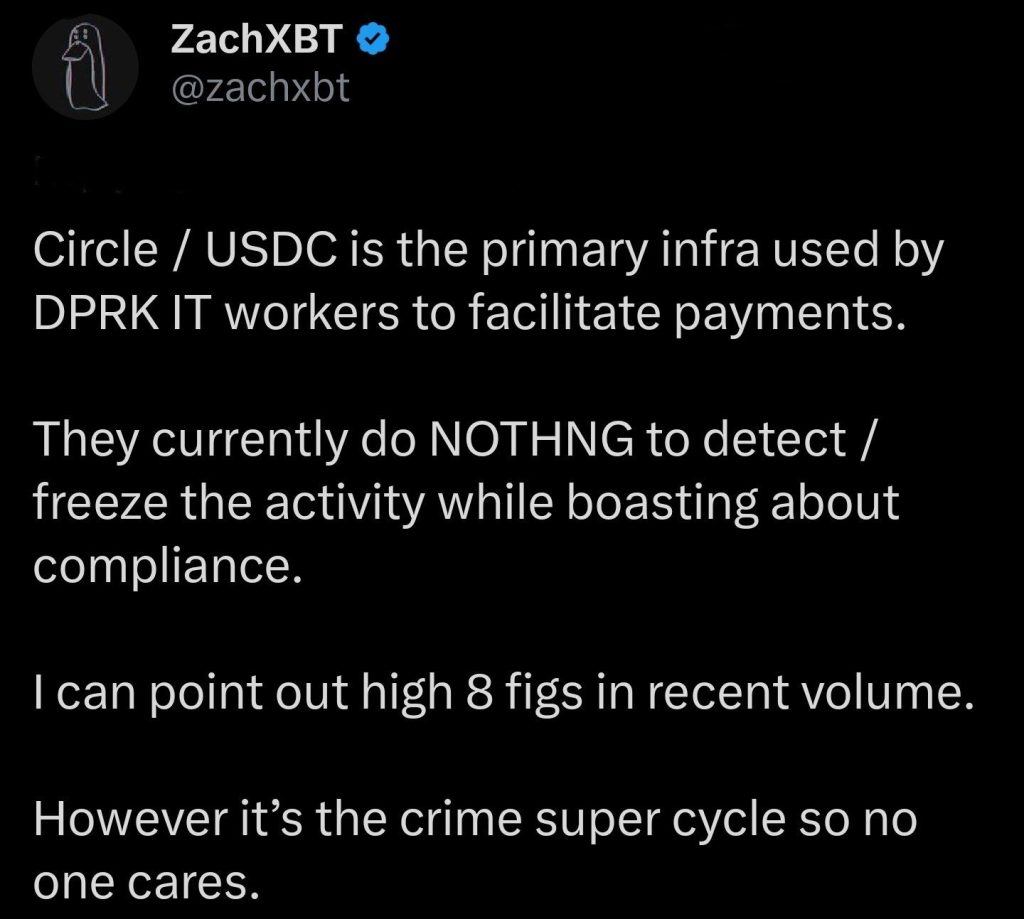
Prominent blockchain investigator ZachXBT has publicly accused Circle’s USDC of serving as “primary infrastructure” for North Korean IT workers to facilitate illicit payments, claiming the regulated stablecoin issuer allegedly does “nothing” to detect or freeze suspicious activity despite boasting about compliance.
His allegations came just as the Financial Action Task Force warned that stablecoins have overtaken traditional cryptocurrencies as the primary tool for online financial crime, especially among state-sponsored actors, due to their speed, liquidity, and legitimacy.
ZachXBT alleged that he could trace recent transactions worth “high eight figures” linked to North Korean IT workers using USDC.
The timing of these accusations coincides with FATF’s stark assessment that DPRK actors, terrorist financiers, and drug traffickers have increasingly turned to stablecoins as their preferred medium for cross-border money movement.
Circle’s Compliance Claims Face Scrutiny as DPRK Operations Scale
ZachXBT’s investigative credibility can be attributed to his successful exposure of major crypto fraud schemes that have led to prosecutions and hundreds of millions in asset recoveries.

His assertion that DPRK IT workers systematically exploit USDC infrastructure may suggest that their operations have achieved significant scale beyond isolated incidents to systematic revenue generation schemes funding weapons programs.
Circle’s position as a regulated stablecoin issuer makes Zach’s accusations particularly disturbing, given the company’s frequent public statements about robust compliance frameworks and cooperation with law enforcement agencies.
The FATF report specifically cited North Korea’s execution of “the largest single virtual asset theft in history” this year, with hackers stealing $1.46 billion from the ByBit exchange, of which only 3.8% has been recovered through international enforcement efforts.
Recent Department of Justice cases have also revealed how North Korean operatives embed themselves in Western companies as remote IT workers, using stolen identities to secure employment before exploiting access to steal cryptocurrency and sensitive data.
Federal prosecutors described these schemes as part of a “cyber-enabled revenue generation network” designed to fund the DPRK’s weapons programs, with one recent case involving defendants who stole over $900,000 in cryptocurrency from their unwitting employers.
The FATF report further bolsters these concerns by noting that industry participants estimate approximately $51 billion in on-chain activity related to fraud and scams occurred in 2024 alone, with stablecoins playing a prominent role in these illicit flows.
Meanwhile, global enforcement agencies have struggled to keep pace with increasingly sophisticated criminal networks that exploit regulatory gaps between jurisdictions, particularly as these groups migrate operations to regions with weaker oversight frameworks.
Stablecoins Emerge as New Frontier in Global Financial Crime Wars
The growing role of stablecoins in criminal finance particularly shows the uneasy balance between their usefulness in payments and DeFi and their potential for scale abuse.
The FATF warned that widespread adoption could exacerbate the problem if regulation doesn’t keep pace quickly enough to contain cross-border risks.
Nearly 100 countries are working on Travel Rule legislation to improve transparency in crypto transactions, but enforcement remains inconsistent.
Recent enforcement actions, including the DOJ’s seizure of $225.3 million in USDT linked to “pig butchering” scams and investigations into Cambodia-based platforms that process $24 billion in criminal flows, further show the scale of the problem.
Another recent report by the UN also detailed how transnational criminal groups have built vast underground economies using stablecoins, with platforms like Huione Guarantee supporting over 970,000 users while offering services from identity forgery to money laundering tools.
However, the disconnect between the borderless nature of stablecoins and the jurisdictional limitations of traditional law enforcement creates persistent vulnerabilities that criminal networks continue to exploit with apparent impunity.
Looking forward, with the GENIUS Act nearing a positive conclusion, stablecoins may eventually be duly regulated, and enforcement measures to prevent misuse can be implemented.
Credit: Source link









